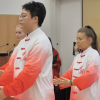SOCIAL_EAST: Searching For Identity, Finding Nylon And Blue Jeans
2022
Oct
12
The Liszt Institute New York in cooperation with the University of Pécs, Hungary, present SOCIAL_EAST: Searching For Identity, Finding Nylon And Blue Jeans, an image-based, speculative exhibition that brings the past into conversation with the present. The exhibition takes place at the Consulate General of Hungary in New York (223 East 52nd St.), starting Thursday, October 13 at 12 pm through Saturday, October 15 at 6 pm. Curators Doris Domoszlai-Lantner and Petra Egri in cooperation with University of Pécs
merge the fashion and dress culture of Hungary’s socialist past with contemporary, globally prolific social media to explore what images users would have shared, and what captions and hashtags they would have written if social media existed during the socialist Kádár era.
Using archival images from the University of Pécs, Communication and Media Studies Department’s Media Lab, the exhibition features black and white photographs, and colored diapositive slides, originally meant to be viewed using a projector. The underlying concepts that tie the images together are also what connect this not-so-distant past to the present. By framing the images in a social media template, the exhibition asks viewers: If social media had existed, what role would it have played in a political system that advocates for the production, distribution, and exchange of goods and content by a community as a whole, rather than individuals?
The text that accompanies each image (captions and hashtags) mirrors the language of contemporary social media posts and plays an important role in contextualizing and investigating the meaning behind the garments worn by these mostly anonymous individuals, and the ways in which those garments negotiated — and were negotiated by — the wearer’s environment. The short captions, some humorous, sarcastic, and even provocative, provide fictionalized glimpses into the wearer’s life. The hashtags both complement and supplement the captions, focusing the audience’s and the potential social media user’s attention on certain words and phrases that are crucial to a holistic analysis of the image.
“While there is documented work about the history of Hungary during this era, there is less information and resources on the cultural — and particularly the fashion — from this time period. The exhibition aims to expand upon the currently available knowledge and
offer a new perspective that brings the past into conversation with the present,”
said co-curators Domoszlai-Lantner and Egri.
Before coming to New York, the exhibition completed a successful multi-leg tour in Hungary, having been on view at: the Ördögkatlan Festival (Aug. 2-6, 2022), the Kozármisleny Cultural Center (Mar. 11-Apr. 8, 2022), and the University of Pécs (Oct. 11-Nov. 30, 2021). In her review of the exhibition, Editor-in-Chief of Glamour Hungary, Krisztina Maróy, exclaimed that “… as simple objects, the photos and slides of this exhibition have been given new life through a digital transformation and in a contemporary framework… making the images, world, and life of the Kádár era present again” (KULTer.hu).
The exhibition is free and open to the public. Interested attendees can register on Eventbrite, and may consider attending one of the following events:
October 14
- Hungarian-language tour, led by Petra Egri at 2pm
- English-language tour, led by Doris Domoszlai-Lantner at 6pm
October 15
- Fashion and archives: Panel discussion with curator Doris Domoszlai-Lantner, Júlia Horváth, co founder of GAHSP Media at 4pm
- Closing reception from 4:45pm
The exhibition’s curators will be dressed by Alma Vetlényi, head designer and creative director of the Hungarian contemporary womenswear brand ALMA.
About the University of Pécs
Founded in 1367, the University of Pécs is Hungary’s first university. Its current total student population is 22,000 students, with over 5,000 international students from 115 countries across the globe. As one of the most highly internationalized higher education institutions in its macro region, the University of Pécs launched a unique intercultural event series, the so-called International Seasons in 2017, which also successfully hosts the Social_East exhibition.
About the Curators
Doris Domoszlai-Lantner is a New York-based fashion historian. She holds an M.A. in Fashion and Textile Studies: History, Theory, Museum Practice from the Fashion Institute of Technology (FIT). Doris has founded and developed several private and corporate fashion archives. She has presented her research at numerous international conferences, including those at Oxford University, University of Lille, France, and Columbia College Chicago. She is the co-founder of the Fashion Forward think tank, and is currently an adjunct instructor at Massachusetts College of Art and Design, and Boston Architectural College. Her co-edited book on digital fashion will be published by Bloomsbury in early 2024.
Petra Egri is an assistant professor at the Department of Applied Arts at the University of Pécs. Her research interests and publications are in the subjects of theater, performance, and fashion. Egri has published her research in professional journals and edited books in English, Hungarian and Russian, served as a co-editor of the Hungarian-language book Contactzones: The Connection of Theatre Studies with Other Fields (Kontaktzónák: Határterületek a színház mentén, Kronosz Press, 2019). Her paper, “The Allegorical Deconstruction of Socialist Style,” on late socialist neo-avantgarde fashion performances, was published in Russian Fashion Theory in 2019. She has lectured at numerous international fashion conferences (Milan, Pontevedra, Moscow, Manchester, Roubaix). Petra is writing a Ph.D. dissertation on major radical performances, analyzing their deconstructive rhetoric with the theoretical background of Jacques Derrida, Paul de Man, and contemporary psychoanalysis.
The archives and the University of Pécs will be represented by Dr. Attila Doboviczki who is an assistant professor in the University of Pécs, Department of Communication and Media Studies. He specializes in visual communications, new media theory, and archives. He wrote his doctoral dissertation on the the Pécsi Műhely (Pécs Workshop), a neo-avant garde fine arts group in the 1970s, playing a significant role in the canonization of their work. He has organized and curated several exhibitions, including at the Pécsi Galéria (Pécs Gallery), where he is the head archivist. Attila has been collecting diapositive slides and photographs for many years, amassing a collection of tens of thousands of pieces, of which many have been digitized through the University’s Telehor Media Lab.
- Log in to post comments
University of Pécs | Chancellery | IT Directorate | Portal group - 2020.
















